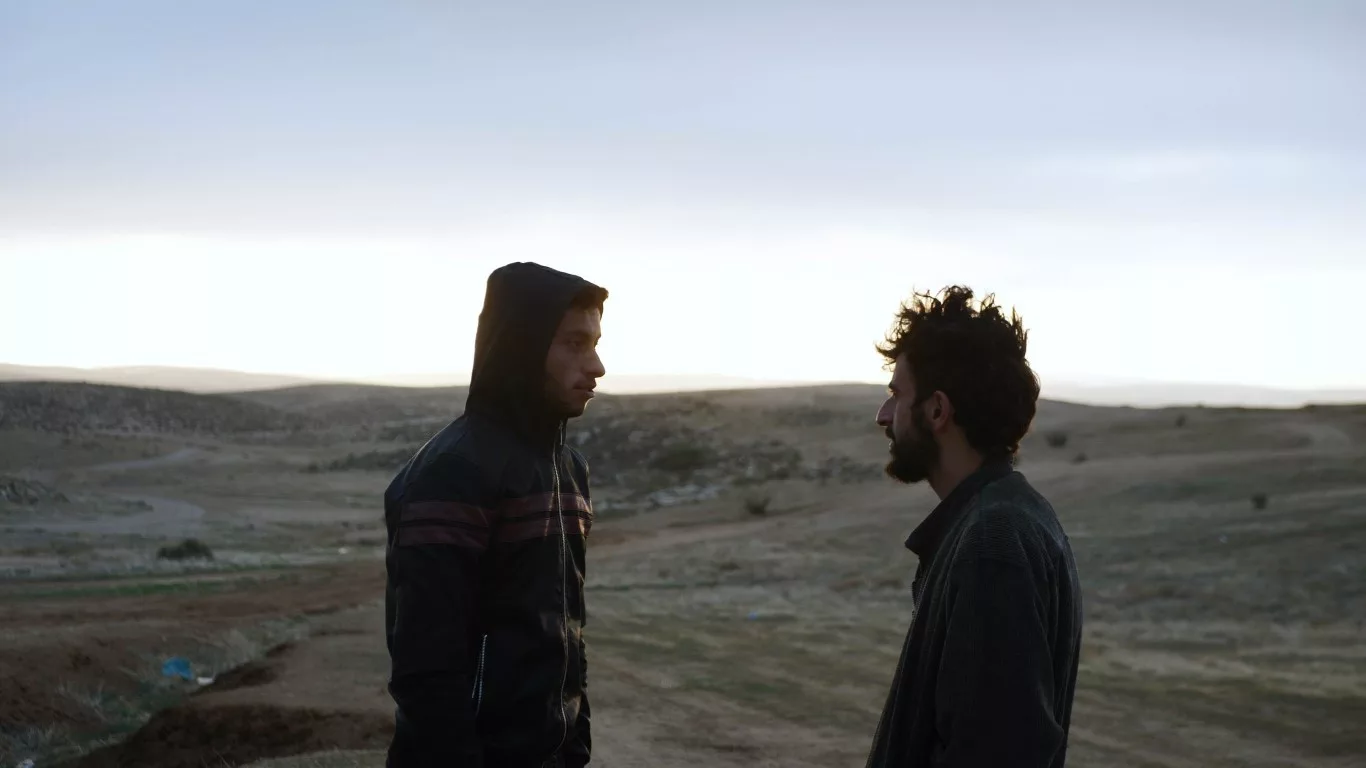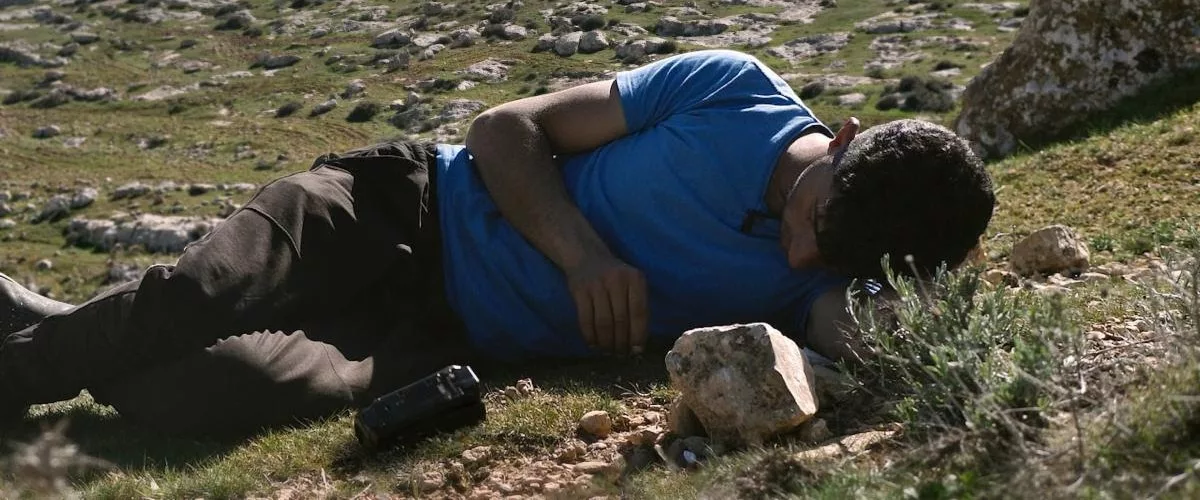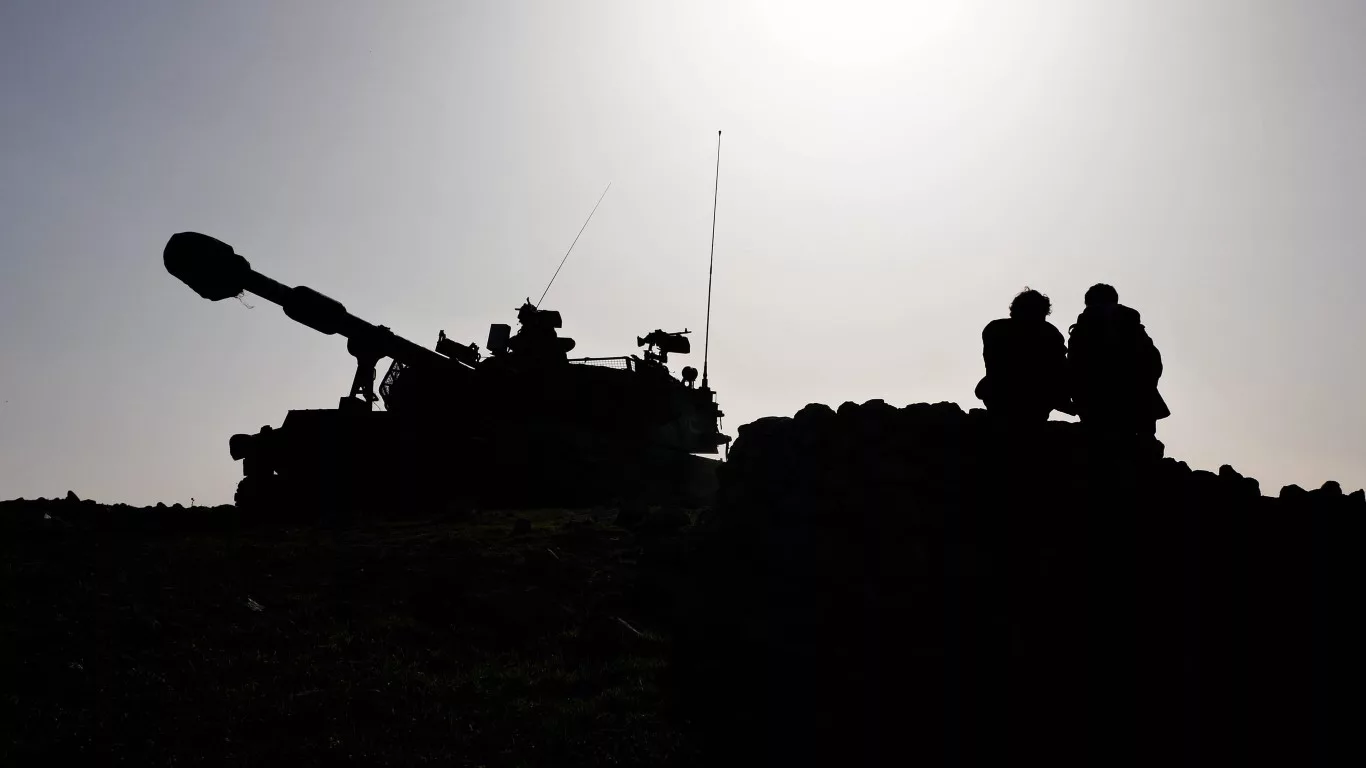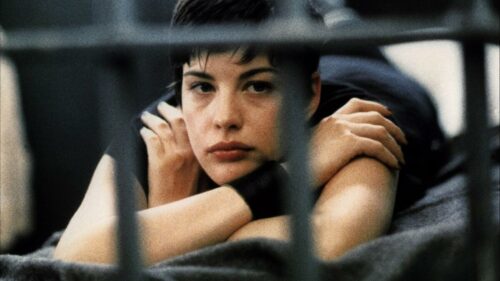Omer M. Mozaffar teaches at Loyola University Chicago, where he is the Muslim Chaplain, teaching courses in Theology and Literature. He has given thousands of talks on Islam since 9/11. He is also a Hollywood Technical Consultant for productions on matters related to Islam, Arabs, South Asians. In 2009, Roger Ebert named him as one of his “Far Flung Correspondents.”
I am thrilled that the Academy Award-winning 2024 documentary “No Other Land” (Yuval Abraham, Basel Adra, Hamdan Ballal, Rachel Szor)—about the Israeli occupation of the Masafer Yatta community in Palestine—is finally getting visibility.
After a few years without formal commercial distribution, the filmmakers began negotiations with MUBI. The team rejected the deal upon news that MUBI received investments from Sequoia Capital, which also invested in Israeli defense tech companies. Sequoia was again in the news because of the departure of its Muslim COO, Sumaiya Balbale, following its inaction over Islamophobic hate from one of its executives.
Instead, the filmmakers chose to distribute the film themselves via VOD on multiple platforms, starting October 20, 2025. They are dedicating 100% of the proceeds to support Masafer Yatta, the Palestinian village they feature in their movie.
“No Other Land” is an important contribution to the narratives of Palestinians and Israelis. For many Palestinians, it captures a moment so many have themselves experienced. For any non-Palestinian, this film is proof that the current violence did not begin with the atrocities of October 7, 2023. If you know history, you also know, however, that displacement of the Palestinians began decades preceding the formal establishment of Israel in 1948 and its subsequent Occupation.
Though I am not Palestinian, this film is very personal for me. Nicknamed “Little Palestine,” Bridgeview, Illinois is a small, lively Chicago suburb a few miles away from me. If you take a short drive along its crowded Harlem Avenue—always seeming to be under construction—you’ll find not only a mix of the usual mom-and-pop strip malls and franchises, but also a rapidly increasing variety of restaurants, jewelry shops, clothing stores, and coffee lounges. While most businesses are Palestinian-run, the area is a new kind of American melting pot: many are from different regions of Palestine or are not Arab at all; they include Yemeni, Turkish, South Asian, and Afghan vendors. Dare I mention that Dubai Chocolate is everywhere here?
Of the tens of thousands of Palestinians living in this area, nearly all—immigrants, refugees, and their descendants—will have stories of encounters with Israeli occupation, including dispossession, torture, and murder. These stories are so common that they can and should fill museums.
Further, I teach history part-time at a Bridgeview girls’ school, which has to close periodically due to bomb threats. Nearly all of my students are Palestinians, including recent refugees, each with their own stories of life and death under Israeli Occupation. These are children telling me their family stories.
If we were to speak only about experiences since the atrocities of October 7th, I have Palestinian university students who have lost dozens of family members, who would have their entire family conduct daily check-ins on group chats to confirm who was still alive. I had a student whose very young local cousin was murdered.
Upon the first Hamas-Israeli ceasefire (November 2023), I have a student who discovered that 100 of his relatives were suddenly arrested by Israeli officers in Jerusalem, distant from Gaza. Then, as we witness forced famine in Gaza that Israel—like every other imperialist nation, blames on the victims—these numb, expressionless students would no longer speak. Last August, one student who lost dozens of family members nearly two years ago in Khan Younis (Gaza), told me he is wrestling with his utter powerlessness.
I have friends—American physicians who served tours in Gaza—telling me they wish they could go through an hour without seeing a dead baby. Or they hesitate to go back for fear of depleting any of the already scarce resources. One physician told me that she had to choose whether or not to use one of her last remaining tourniquets on a young man who arrived carrying his dismembered leg, knowing he would die within the next few hours.
Retired Green Beret Anthony Aguilar was a Whistleblower exposing Israeli officers committing violence against Palestinian civilians as they sought to gain food aid. Contractors, as well, were firing automatic weapons into the crowds. A physician told me that his patient had joined those crowds seeking food, yet was hoping to get shot and killed, rather than continue to suffer.
Again, after 10/7, I have multiple students whose family members were forced by Israeli forces to vacate their homes in the West Bank, a space separate from Gaza. Some of these seizures are finally getting some attention.
As a friend, teacher, chaplain, or therapist, how do you console someone who has lost a few relatives in one moment; what to think of 120 gone in one or two American-sponsored Israeli bombings? What about all of these other examples?

Consider, further, the film’s experience, its crew, and the lives of the people they documented. None of the following is in or near Gaza.
- In September 2025, Israeli forces searched director Basel Adra’s home after Israeli settlers attacked him. They did not stop the settlers from beating a female activist.
- In July 2025, one of the contributors to the film (Odeh Hadaleen, whose name gets multiple spellings in the press) was murdered, allegedly by one among those groups of Israeli settlers we find antagonizing Palestinians throughout the film.
- Weeks earlier, the Israeli government made plans to destroy over half of the 20 villages of Masafer Yatta and expel all its natives; this movie is itself about a prior forced expulsion of a thousand Masafer Yatta occupants. The Israeli Information Center of Human Rights in the Occupied Territories regards such acts as accelerating ethnic cleansing.
- March 2025: Director Hamdan Ballal was attacked by Israeli settlers. Israeli soldiers removed him before completing medical care and placed him in detention.
- At the end of the film, we watch an Israeli settler shoot a young man (Zakaria al-Adra); the news informs us in 2024 that the shooter was not charged.
- Not violent, yet still concerning, the mayor of Miami Beach relented after he tried to cancel a movie theater’s lease for screening the film.
It is a shame. For a film that earned near perfect critical reviews, numerous accolades and awards—including the international film festivals of Berlin, Busan, Copenhagen (Documentary), Montreal (Documentary), and Vancouver, and the Film Critics awards of Chicago, Boston, London, Los Angeles, Seattle, St. Louis, and Toronto—until now, it was as difficult to find an online streamer for the movie as it is to find a cinema screening it.
Is it ironic that this film provoked such a loud response yet is so quiet? Much of the film is silent.
It begins in silence: a young man (Basel Adra) drives through a dark night. He does not respond to a family group chat when one caller tells him that the military surrounds the village, and multiple concerned family voices call upon him to come home. They fear something is about to happen.
In voiceover, Basel remembers realizing that, although he was a shepherd son of the owner of a self-made gas station—made from a tank he dug under his house—his was a family of activists. He was five when he watched his father’s first arrest. He was seven when he first witnessed an anti-Occupation protest, during which his elderly grandfather yelled at armed soldiers, while they manhandled his father. In the film’s final minutes, Basel welcomes his father from yet another release from prison.
Their community, Masafer Yatta, comprises 20 small villages in the mountains of the West Bank. For the next hour and a half, we watch Palestinian villagers try to live simple, small. agrarian lives with the same hopes anyone in any other village would have, while a combination of Israeli soldiers, settlers, and construction workers destroy their homes, farms, businesses, and dreams.
Each sequence in the film seems to follow the same form. Someone in the family notices something ominous, like helicopters. Then, the occupying forces arrive in jeeps and tanks. The locals yell at the soldiers, hoping for some humanity and compassion. Instead, the soldiers and contractors are as cold and mechanical as the bulldozers they use to demolish everything. The soldiers leave. Then the locals try to rebuild. Then, some time later, a repeat of all these steps.
Whether it is a home or a school building, it is built one day and soon destroyed. Soon, they rebuild. One man says that his whole life’s purpose has been reduced to simply having a home.
When the soldiers are asked if they are ashamed, they reply, “It is the law, why should I be ashamed?” In other words, they sound like Immigration and Customs Enforcement (ICE) troopers in an American neighborhood, commenting, “I am just following orders.”
Each Israeli demolition in Masafer Yatta was conducted in the name of setting up military training facilities, yet was instead used to provide suburban-American-styled homes for settlers. Supporters of the Occupation will tell you that they are implementing laws of military conscription continued from the Ottoman empire — as though that absolves the nation — but will not be able to explain why the Israelis quickly build neighborhoods for settlers on those exact locations. In the film’s closing, we learn that state documents reveal that the goal of establishing these “training zones” was to block Arab villagers from expanding.
When the locals protest, the soldiers arrive with ultimatums, new rules, and threats to return with more force. Sometimes, in the middle of the night, they kidnap young men. Sometimes they announce that the roads now belong to them and steal the cars. Sometimes they claim the farms, bury ancient wells in concrete, and cut off the water supply. In other words, if the Palestinians remain silent, they lose their homes. If they protest, they lose even more.
I should comment that the story of Palestinian water is its own story of persecution. If you travel through those remaining Palestinian territories, you will discover that the Israelis have controlled water resources since 1967. And since then, to such a degree that the black buckets that Palestinians keep on their roofs to collect rainwater are not only illegal but also common for settlers to shoot holes in them. Yes, even when giving some authority to the Palestinian Water Authority, Israel almost lays claim to the rain.

We are introduced to another director, Yuval Abraham, as he meets Basel’s family. Basel’s family members are exhausted, angry, depleted, skeptical, and yet friendly. Their homes are a mix of cinderblocks and ancient caves. Consider this: these are modern people, not medieval mystics living in caves, by necessity rather than by choice. Sometimes they vent their frustrations to Yuval, as though he has any power to help them, except to listen to them vent their pain.
Yuval is a young Israeli journalist with the freedom to travel, safely, everywhere. He was recruited to join Israeli intelligence but refused. He believes something obvious to nearly every Palestinian, that the key to Israeli security is Palestinian freedom, with the full opportunities of democracy. In the same way that I know his views are consistent with those of my own Jewish and Israeli students, I want to believe that he is not an anomaly. I want to believe that he represents a common sentiment among at least the Israeli youth, who recognize that a baby or child of any family is of immeasurable sacredness. Soldiers and contractors, in contrast, call him “A Jew who is helping them”—meaning, a traitor—threatening him with doxxing or worse.
Yuval and Basel talk. Basel, surprisingly, has a law degree. He cannot, however, practice in anything except Israeli constructions over former Palestinian homes, and has lost much hope in anything except the distant one that they will outlast the Israeli onslaughts. You would want to believe that Basel is an anomaly, but such has been my experience: in the Occupied territories, I personally met Palestinians with advanced degrees who were relegated to labor and lower-level clerical positions. I have Palestinian students here whose relatives there are in identical desperate straits in which they could only get jobs working construction for the very Israeli companies tearing down Palestinian villages. Thus, when Basel is away from home, the stress of home remains in him: with his motionlessness and silence, I suspect any therapist would detect that he is deep in clinical depression. As he puffs from a hookah pipe, his tired eyes staring into the distance, what is he thinking about?
Meanwhile, another woman—the mother of Harun, a son of the Israeli soldiers paralyzed—says that nobody will come to help them. She is in such bewilderment that she almost hopes her son will die rather than continue to suffer. At the end of the film, her pained wish gets fulfilled.
Above, I mentioned the menace of Israeli settlers. Two-thirds into the film, they appear, at times taunting, at times attacking the Palestinians. These are armed citizens who seem to exist outside the law, with full backing and protection of the soldiers.
Thus, I wonder if this film became a modern relic as soon as it was completed. As soon as it was completed, the events of October 7th and the subsequent responses unfolded. While events identical to those in the film continue through to this day, especially in Masafer Yatta, for many—especially in Gaza—we are now entering the end. All of us have hope in the latest ceasefire. Perhaps all of us have skepticism about any reliable adherence to the truce, especially because Israel continues to kill Palestinians in Gaza.
So, perhaps the worst shame of this film is that any of this is happening, that this film had to exist.












